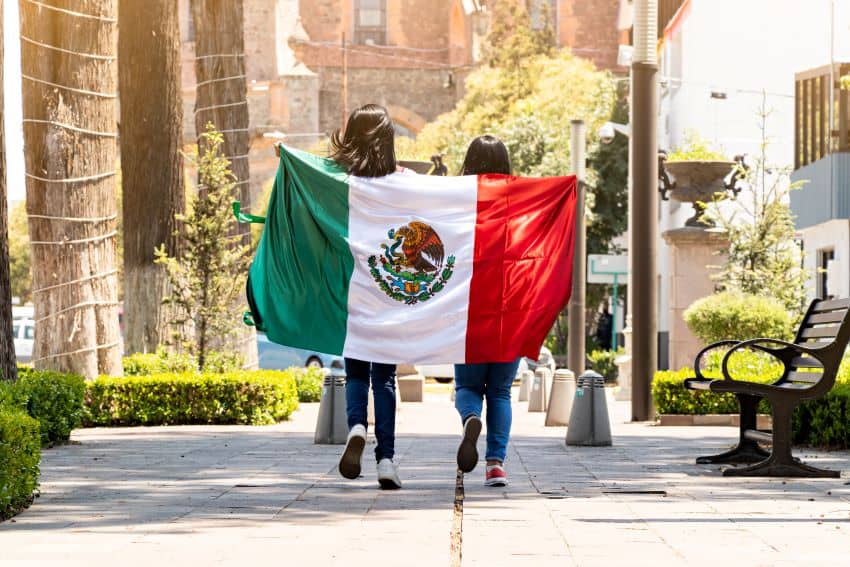I still remember clearly the first time I had a group of Mexicans glare angrily at me.
I don’t remember my exact wording, but I was exasperated and said something like, “Why can’t Mexico figure out that these milk boxes are not actually easy to open at all?” with a chuckle to my host family. (The milk boxes back then said “abre fácil” – “easy open” – but were anything but easy: you had to tear off the corner of it and I always wound up making a huge mess of it).

I wasn’t trying to insult anyone, but boy did I learn my lesson: while this is an incredibly bromista (joke-loving) culture where sarcasm does indeed hold a place of honor, sarcasm applied by a foreigner regarding the way something is done in Mexico is most definitely not appreciated.
This was over 20 years ago, and I’ve learned quite a bit more about this particular culture’s sensitivities since then. And as more and more of my paisanos join me in this beautiful country, I think some studied consideration about how to be respectful a la mexicana is in order, especially as natural tensions in some sectors are rising with such an influx of new people.
To be good guests and immigrants, here are some things to remember:
- Mexicans wear their pride on their sleeves; this goes for personal and national pride, by the way. As a country, Mexico has been both invaded and put down (by, collectively, us) enough to be a little sensitive about criticisms toward them…especially by newcomer outsiders. Indeed, who enjoys criticism at all?
Every country, as we well know, has things they do well and things they don’t do so well. If you need to vent about the “not so well” category around here, try to keep it restricted to your personal journal or a close friend or therapist rather than venting online.
Because as some of us have learned the hard way, social media is not a place where nuance can be easily detected and emotions stay calm. Foreigners who vent in public or even private groups seem to find themselves more and more met with an angry “Why don’t you just go back where you came from” sentiment (which, curiously, tends to come much more frequently from the political left rather than the right). - Make your curiosity bigger than your desire to start every sentence with, “Well, where I come from…”. Spoiler alert: most Mexicans already know what things are like where we come from if where we come from is the US or Canada.
No one has bad intentions when they start talking about themselves…it’s a way to start or keep a conversation going, after all. But it behooves all of us to remember that most basic of conversational skills: to make a great impression, let the other person do the talking (and really listen).
And if you can, make your best effort to do it in Spanish!

Living in Mexico is a chance to try something new and different, so embrace the experience! (Depositphotos) - Tensions between the economically advantaged and the not-so-advantaged are just as high here as they are elsewhere. And as I’ve said before, seeing a group of people who don’t necessarily work harder or even have more education than you knocking it out of the park because they’re gaming the system (earning in one economy and spending in a different, cheaper one) while you struggle doesn’t feel good.
“But our spending here is helping the economy” might be logical, but nowhere in the world are people logical; they’re emotional. Nor are they usually thinking about the advantages, on a country-wide level, of tourism. What they’re thinking about is the fact that rents have gone up exponentially in areas newly popular with dollar-bearing newcomers and their menus are suddenly in English.
So, what to do? On a practical level, do your best to find out the actual costs of homes and services in a certain area that locals are accustomed to paying rather than simply laying down whatever money’s asked because it’s cheap to you, specifically. Too many people doing this is exactly what drives gentrification, a topic that has many locals in newly-popular areas particularly tense.
At the very least, don’t behave as if you’re doing anyone a favor by spending money here or crowing loudly about “how affordable Mexico is.” For most people living here, it’s not. So enjoy what luxuries you might not have been able to in your home country, but remember that they’re still out of reach for most people.
- Not everyone is into fast change. In places that have long been known for their catering to the tourist crowd like Los Cabos or Cancún, people know what to expect: lots of English-speaking establishments, high rents, services catering specifically to the tastes of foreigners. Those changes happened long ago, and they’re used to it. In newly-popular areas in Mexico, things are changing (and gentrifying) fast, and not everybody is into it.
In those places that used to be considered “the real Mexico” where not many foreigners could be seen (Oaxaca city comes to mind), the speed of change is a touchy subject for some Mexican residents…especially when it’s accompanied by increased prices for everyone (which is not solely a result of the influx, but the optics make it seem like it is). On the positive side, most Mexicans are honored and proud to see that so many foreigners have fallen in love with their culture and communities, so emphasizing that can do wonders.
Mexico is a delightful and magical place, and it’s a country where most residents are warm and open to the newly arrived. Our task, then, is to remember to be good neighbors first, and careful not to treat our new homes as an amusement park: squeal with delight on the inside.
Sarah DeVries is a writer and translator based in Xalapa, Veracruz. She can be reached through her website, sarahedevries.substack.com.

